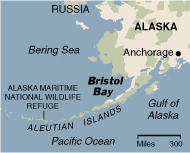skip to main |
skip to sidebar
Article: Bristol Bay

Bush Mulls Resumed Energy Drilling Off Alaska
New York Times
December 4, 2006
By FELICITY BARRINGER
WASHINGTON, Dec. 3 — President Bush is considering whether to lift the 17-year-old moratorium on energy drilling in the waters off southwestern Alaska, a White House spokeswoman said Sunday, which would allow oil and gas companies to try to tap into more than five trillion cubic feet of natural gas that lies beneath rich fishing grounds.
The push to market oil and gas leases in these waters, which oil and gas companies favor, is part of a larger national effort to expand domestic supplies of fossil fuel by opening up areas of the outer continental shelf, long off-limits to energy development.
 Last summer the Interior Department recommended reopening several areas of the outer continental shelf, including the southern part of Bristol Bay, which lies just north of where the Aleutian Islands meet the Alaskan mainland, to energy exploration. The report said that 14 oil and gas companies had supported the idea. The department has estimated that such a move could create up to 11,500 jobs, part of what it describes as “net benefits” of $7.7 billion.
Last summer the Interior Department recommended reopening several areas of the outer continental shelf, including the southern part of Bristol Bay, which lies just north of where the Aleutian Islands meet the Alaskan mainland, to energy exploration. The report said that 14 oil and gas companies had supported the idea. The department has estimated that such a move could create up to 11,500 jobs, part of what it describes as “net benefits” of $7.7 billion.
In a letter to President Bush on Friday, a coalition of environmental groups, including the Wilderness Society, the Sierra Club and the Natural Resources Defense Counsel, citing the impact of the Exxon Valdez oil spill, called the bay “an economically critical salmon fishery,” adding that “it provides essential habitat for the endangered northern right whale.”
The executive director of Greenpeace, John Passacantando, said Sunday that the Bering Sea was “the most intact marine ecosystem in United States waters” and that Bristol Bay was “among the most important parts of the Bering Sea.”
Asked about the potential impact of an outer continental shelf leasing program confined to the southern waters of the bay, Mr. Passacantando said: “The energy industry ultimately gives you things that look like the Exxon Valdez. It was because of the threat of this kind of spill that that leases were initially rescinded.”
He was referring to a handful of oil leases that were granted in the southern part of Bristol Bay in 1988, then bought back by the federal government after the Exxon Valdez supertanker, with a captain who had been drinking, ran aground on Bligh Reef in March 1989. The tanker ruptured and spilled 11 million gallons of crude oil into the sound.
The Alaska Economic Development Commission has supported opening the area to expand economic diversification, and has concluded that the impact on marine life can be “fully mitigated,” the Interior Department reported.
When Congress, acting at the urging of Alaska’s senior senator, Ted Stevens, a Republican, rescinded its protections for Bristol Bay in 2003, the area remained protected by earlier presidential decisions, first by President George Bush in 1991 and then, in 1998, by President Bill Clinton, who put the area off-limits to energy leasing until 2012.
There has been widespread speculation among environmental groups and fishing industry representatives that President Bush would end the moratorium during the lame-duck session of Congress, allowing the Interior Department to proceed with its plans to market oil and gas leases in the southern section of the bay, along the north coast of the Aleutian Islands.
The Associated Press reported over the weekend that the administration was considering ending the moratorium, a report that was confirmed by a White House spokeswoman, Emily Lawrimore. She would not comment on the merits of the debate but said the president was considering whether to end the leasing moratorium.
Representative Edward J. Markey, Democrat of Massachusetts, said in a statement Sunday that “executive withdrawal on oil and gas leasing in Alaska’s Bristol Bay, one of our nation’s most sensitive fisheries, combined with House Republicans scheduling a vote next week to expand offshore drilling off Florida’s coast, only underscores that G.O.P. stands for Gas and Oil Party.”
Mr. Markey added, “The administration should be leading efforts to increase fuel economy standards, which would dramatically reduce our dependence on foreign oil.”

Last summer the Interior Department recommended reopening several areas of the outer continental shelf, including the southern part of Bristol Bay, which lies just north of where the Aleutian Islands meet the Alaskan mainland, to energy exploration. The report said that 14 oil and gas companies had supported the idea. The department has estimated that such a move could create up to 11,500 jobs, part of what it describes as “net benefits” of $7.7 billion.
No comments:
Post a Comment